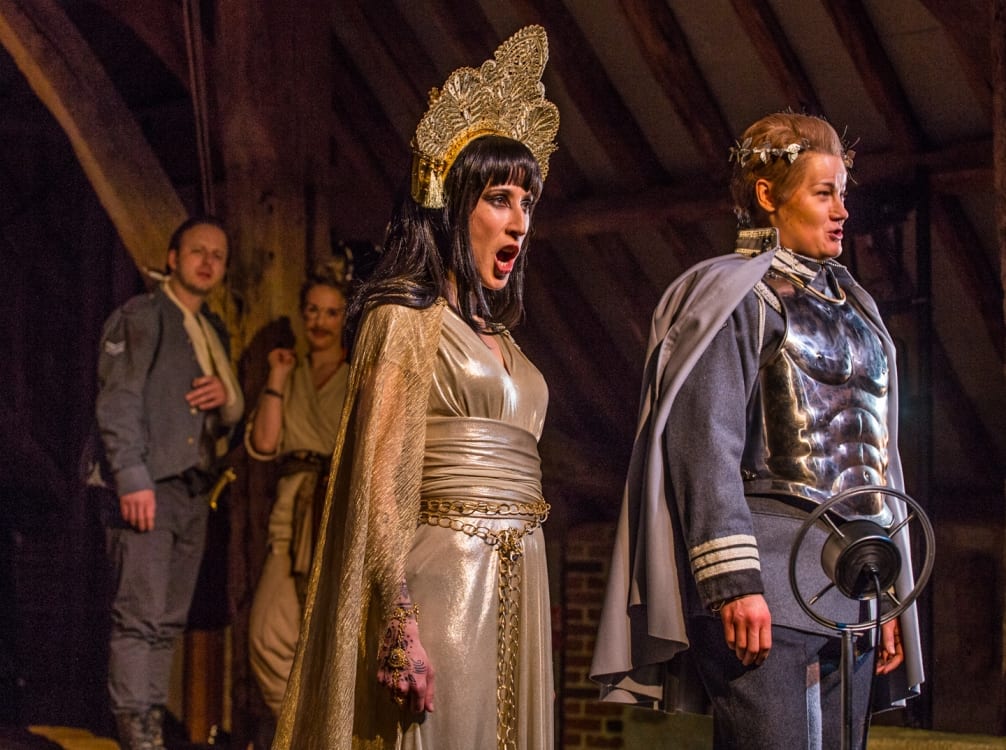John Coke and his team at Bury Court have conjured up a minor miracle with a production of Giulio Cesare that does full justice to one of Handel’s finest operas. Despite the limitations of the barn at Bury Court, the ingenuity of director Greg Eldridge and designer Elliott Squire has developed a piece of music theatre that grips and delights for the entire evening.
At the end of the civil war, Caesar is pursuing the beaten Pompey who has unwisely sought refuge in Egypt where Ptolemy and his sister Cleopatra are rivals for the throne. Ptolemy murders Pompey in the hope of winning Caesar’s gratitude and consigns Pompey’s widow to his harem. However, Caesar condemns the act as a barbarian outrage and this sets off a power struggle in which fortunes sway back and forth until its conclusion with Caesar triumphant and his new lover Cleopatra installed as Queen of Egypt.
Baroque opera makes huge demands on the style and stamina of singers and the team of young performers at Bury Court are simply superb. In 1724 when the opera was first performed, gender fluidity was the operatic norm. Key heroic roles were almost always sung by castrati and there were often male roles sung by sopranos. This production was fortunate to find two splendid counter tenors – John Lattimore and Russell Harcourt – for the roles of Tolomeo (Ptolemy) and Sesto while the role sung by the superstar castrato, Senesino, in the original production was sung by mezzo Helen Sherman. Soprano Marie Lys was a cunning and seductive Cleopatra.
As Caesar Helen Sherman sang with power and grace, handling the demands of some of Handel’s most testing arias with aplomb. She seemed slightly ill at ease in the full military gear and an unforgiving wig in the early scenes but the arrival of Cleopatra seemed to give her the impetus to find her inner general. Marie Lys almost stole the show as Cleopatra. She has a rich and stylish soprano voice and she can act too – her seduction of Caesar in disguise as the slave girl Lidia was sexy and funny at the same time. And a word of praise for designer Elliott Squire who dressed Cleopatra in a succession of stunning dresses with perhaps a homage to Elizabeth Taylor in the finale. John Lattimore was a dominant figure as the cunning and sadistic Tolomeo and his fine high notes were a joy. Russell Harcourt as the distraught son of Pompey bent on avenging the death of his father sang with style and subtlety, though he didn’t really need the shorts and long socks to emphasise his youth. Also worthy of the highest praise were Catherine Hopper as Cornelia and David Ireland as Achilla but there was not a weak link anywhere and this was underscored by the splendid all-too-brief ensemble finale.
The Camerata Alma Viva conducted by the brilliant Dane Lam provided the perfect musical backdrop for the action and there were moments of solo stardom for violin and harpsichord that added significantly to the evening’s pleasure. There was a clever set with huge ‘stone’ blocks (light enough to be lifted by a single chorus member) that conjured up the look of the pyramids and the action never flagged. As a critic it is rare to get carried away by the sheer joy and exuberance of a production but this production of Giulio Cesare was one of those rare and special evenings.

